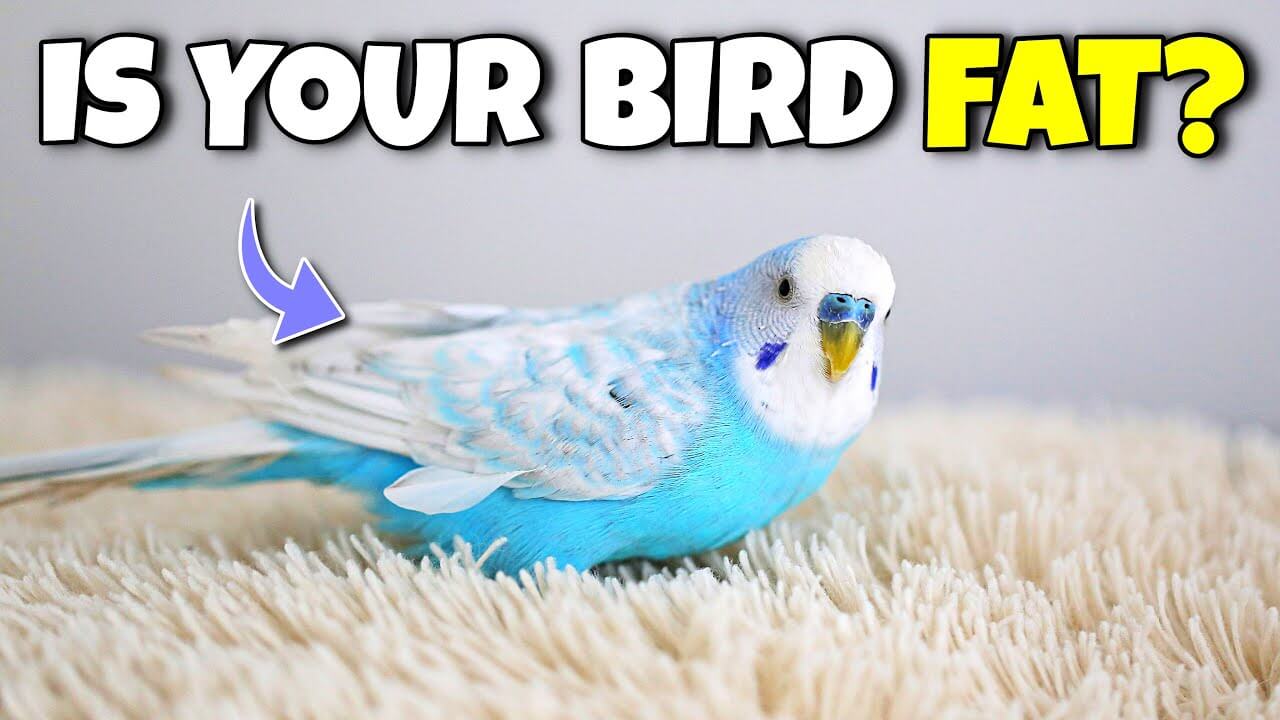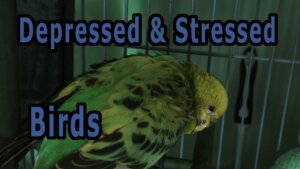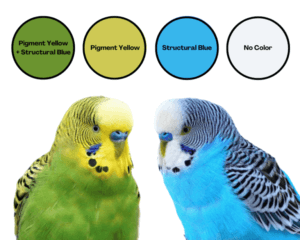How Can You Tell If Your Budgie Is Overweight?
You can tell if your budgie is overweight by checking its keel bone and observing its overall shape. A visible keel bone indicates a healthy weight.
Budgies, like all pets, require careful monitoring to ensure they remain healthy. Obesity in budgies can lead to serious health issues, including heart disease and liver problems. Regularly checking your budgie’s weight is crucial for its well-being. Feel your bird’s keel bone, located along the chest.
A healthy budgie will have a slightly protruding keel bone. If you struggle to feel it or notice excessive fat deposits, your budgie may be overweight. Observe its shape; a rounded body can also signal weight issues. Maintaining a balanced diet and encouraging exercise are key to keeping your budgie fit.
Identifying A Healthy Budgie
Understanding the signs of a healthy budgie is crucial for pet owners. A healthy budgie is active, playful, and maintains an ideal weight. Knowing how to identify if your budgie is overweight can help prevent health issues.
Normal Weight Range
Budgies usually weigh between 25 to 35 grams. Weigh your budgie regularly to ensure it stays within this range. Use a digital scale for accurate measurement.
| Budgie Type | Normal Weight Range |
|---|---|
| Standard Budgie | 25-35 grams |
| English Budgie | 45-60 grams |
Physical Appearance
Observe your budgie’s physical appearance closely. A healthy budgie has a sleek, streamlined body. Feathers should be smooth and lie flat against the body.
- Check for visible breastbone.
- Feel for excess fat around the abdomen.
- Notice the bird’s activity level and behavior.
Feel your budgie’s breastbone. It should be easy to feel but not too prominent. If you can’t feel it, your budgie may be overweight. If it’s very prominent, your budgie may be underweight.
Watch for signs of labored breathing or lethargy. These can indicate weight issues. Ensure your budgie has a balanced diet and plenty of exercise.

Credit: www.ukpetfood.org
Common Causes Of Weight Gain
Understanding the common causes of weight gain in budgies is essential. It helps keep your feathered friend healthy. Let’s explore the primary reasons why your budgie might be gaining weight.
Dietary Factors
One major cause of weight gain is poor diet. Many owners give their budgies too many seeds. Seeds are high in fat and low in nutrients.
Budgies need a balanced diet. This should include pellets, fresh fruits, and vegetables. Too many treats can also lead to weight gain. Limit sugary and fatty treats.
Here’s a simple dietary guideline:
| Food Type | Percentage of Diet |
|---|---|
| Pellets | 60% |
| Fresh Fruits and Vegetables | 30% |
| Seeds and Treats | 10% |
Lack Of Exercise
Exercise is vital for maintaining a healthy weight. Budgies that don’t get enough exercise can easily gain weight.
Ensure your budgie has enough space to fly. A small cage restricts movement and exercise. Allow your budgie out of the cage daily for some free flight time.
Engage your budgie with toys and activities. Climbing, swinging, and playing can help burn calories. Here’s a list of activities to encourage exercise:
- Install perches at different heights.
- Add swings and ladders.
- Use interactive toys like bells and mirrors.
- Spend time playing with your budgie.
Remember, a healthy budgie is an active budgie. Keep them moving and entertained.
Visual Signs Of Overweight Budgies
Monitoring your budgie’s weight is crucial. Overweight budgies can face health issues. Spotting visual signs helps you take action early. Look for these specific signs.
Bulging Chest Area
A healthy budgie has a smooth chest. An overweight budgie shows a bulging chest area. The chest appears round and full. This is due to excess fat around the breastbone. Compare your bird’s chest with pictures of healthy budgies.
Visible Fat Deposits
Excess fat can gather under the skin. Look for visible fat deposits around the abdomen. These deposits look like small lumps. You can also check under the wings. Fat deposits here indicate an overweight condition.
| Area | Signs |
|---|---|
| Chest | Bulging, round appearance |
| Abdomen | Fat lumps under the skin |
| Under wings | Visible fat deposits |
- Check the chest for bulging.
- Look for fat deposits on the abdomen.
- Inspect under the wings.
- Observe your budgie’s daily activities.
- Maintain a balanced diet.
- Provide enough exercise.
- Behavioral Indicators
Understanding your budgie’s behavior can help you spot weight issues early. Look for signs that indicate your budgie might be overweight. Behavioral indicators are often the first clues.
Lethargy
Budgies are naturally active birds. If your budgie seems less energetic, it might be a sign of being overweight. An overweight budgie might spend more time sitting than playing or flying. They may also show less interest in their toys and surroundings.
- Sitting for long periods
- Less playtime
- Reduced interaction with toys
Difficulty Flying
Flying is an essential part of a budgie’s life. Overweight budgies may have trouble taking off or maintaining flight. They might struggle to reach their usual perches or fly shorter distances.
| Indicator | Description |
|---|---|
| Short flights | Your budgie flies only short distances. |
| Frequent falls | They fall more often during flight. |
| Struggling to perch | Difficulty reaching high perches. |
Observe your budgie carefully. Noticing these signs early can help you take action to improve their health.
Health Risks Of Obesity
Obesity in budgies can lead to several health issues. An overweight budgie may suffer from serious problems that can affect its overall well-being. Understanding these risks can help you keep your feathered friend healthy.
Respiratory Problems
Extra weight can cause respiratory problems in budgies. Fat deposits around the chest can make it harder for them to breathe. You might notice your budgie panting or struggling for air. This can lead to reduced oxygen levels in their body. As a result, your budgie may become lethargic and less active.
Heart Disease
Obesity increases the risk of heart disease in budgies. Extra fat around the heart can make it work harder. This can lead to heart failure or other serious conditions. Symptoms to watch for include a rapid heartbeat and difficulty in flying. A healthy diet and exercise can help prevent these issues.
| Health Risk | Symptoms |
|---|---|
| Respiratory Problems | Panting, struggling for air, lethargy |
| Heart Disease | Rapid heartbeat, difficulty in flying |
Keeping your budgie at a healthy weight is crucial. Regular check-ups with a vet can help detect issues early. Ensure your budgie has a balanced diet and enough exercise.

Credit: www.reddit.com
Weighing Your Budgie
Weighing your budgie is crucial for its health. Knowing its weight helps you spot issues early. It’s a simple process that you can do at home.
Using A Bird Scale
A bird scale is the best tool to weigh your budgie. Choose a scale designed for birds for accurate results.
- Place the scale on a flat surface.
- Let your budgie step onto the scale calmly.
- Record the weight displayed on the scale.
Ensure the scale is stable to avoid inaccurate readings. Weighing your budgie regularly helps track its health.
Frequency Of Weigh-ins
Weigh your budgie weekly. This frequency helps you monitor its health effectively.
| Frequency | Reason |
|---|---|
| Weekly | Track weight changes |
| Monthly | For less frequent monitoring |
Weekly weigh-ins are ideal for early detection of weight issues. Create a routine to make it easier.
Monitor your budgie’s weight to ensure it stays healthy. Keep a record of each weigh-in for future reference.
Diet Adjustments
Making diet adjustments can help your budgie lose weight. A balanced diet and controlled portions are key.
Healthy Food Choices
Feed your budgie a mix of seeds, pellets, and fresh vegetables. Seeds are high in fat. Limit them to avoid weight gain. Opt for pellets as they are more balanced. Include fresh fruits and vegetables like:
- Carrots
- Spinach
- Broccoli
- Apples
Avoid feeding your budgie high-fat foods. Stay clear of junk food and sugary treats. These can lead to obesity and health issues.
Portion Control
Use a measuring spoon to control portions. Overfeeding can make your budgie overweight. Measure out their food each day.
Stick to a feeding schedule. Give small portions throughout the day. This keeps their metabolism active and prevents overeating.
Use the table below for portion guidelines:
| Food Type | Daily Portion |
|---|---|
| Seeds | 1-2 teaspoons |
| Pellets | 1-2 tablespoons |
| Fresh Vegetables | 1 tablespoon |
| Fresh Fruits | 1 slice |
Monitor your budgie’s weight regularly. Adjust portions as needed to maintain a healthy weight.

Credit: www.ukpetfood.org
Encouraging Physical Activity
Encouraging your budgie to stay active is crucial for its health. Overweight budgies can face serious health issues. Keeping them engaged with physical activities is key. Here are some ways to encourage your feathered friend to move more.
Interactive Toys
Interactive toys can keep your budgie entertained and active. Choose toys that encourage climbing, swinging, and foraging. A variety of toys can prevent boredom and stimulate their mind.
- Climbing ropes: Budgies love to climb. Ropes can be a great addition to their cage.
- Swings: Swings provide a fun way to keep your budgie moving.
- Foraging toys: These toys hide treats. They encourage your budgie to forage, mimicking natural behavior.
Flight Time
Allowing your budgie ample flight time is essential. Free flight in a safe area helps burn calories. Ensure the room is free from hazards.
| Activity | Duration | Benefits |
|---|---|---|
| Free Flight | 1-2 hours daily | Burns calories, strengthens muscles |
| Guided Flight | 15-30 minutes | Improves coordination, builds trust |
During flight time, supervise your budgie. This ensures its safety and maximizes exercise benefits.
Frequently Asked Questions
How Do I Know If My Budgie Is Overweight?
An overweight budgie will have a rounder body and less visible keel bone. You may also notice difficulty in flying.
What Are The Signs Of An Overweight Budgie?
Signs include a bulging chest, difficulty flying, and excessive fat deposits around the abdomen and thighs.
How Can I Weigh My Budgie At Home?
Use a small digital scale and gently place your budgie on it. Weighing weekly can help monitor changes.
What Causes Budgies To Become Overweight?
Overfeeding, lack of exercise, and a diet high in seeds can lead to weight gain in budgies.
Conclusion
Recognizing an overweight budgie is crucial for its health. Regularly monitor its weight and diet. Ensure it has ample exercise opportunities. Consulting a vet can provide tailored advice. Keeping your budgie healthy will lead to a happier, longer life. Stay vigilant and proactive in your pet’s care.
Hello Dear, I'm Poli Kolymnia, owner of many birds (including budgies).
With a deep passion for these feathered companions, I'm here to share my expertise and extensive knowledge on birds care.
My articles cover essential topics like diet, housing, care, and health, providing practical tips to help you create a happy and thriving environment for your birds.







